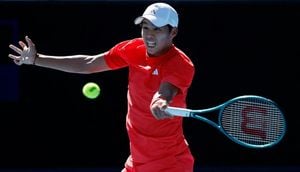Winterberg, Germany – The Skeleton World Cup held on Friday at Winterberg was marked by remarkable performances from Austrian athletes, including Janine Flock and Samuel Maier. Flock clinched her first victory of the season, edging out her competitors with confidence and skill.
Flock, who finished the first run just one hundredth of a second ahead, triumphed with a final time 0.27 seconds faster than Czech competitor Anna Fernstedt, and 0.29 seconds clear of Olympic champion Hannah Neise from Germany. With six out of eight World Cup events completed, Flock now stands 23 points behind Neise, the second-place overall leader.
“I’m thrilled with how I performed today, especially facing tough competition,” said Flock. “Achieving this win at such a pivotal point of the season feels incredible.”
Meanwhile, in the men’s division, Christopher Grotheer made headlines as he returned from injury to secure third place, delivering one of his signature strong finishes. Grotheer, who is both the Olympic champion and seven-time world champion, had missed three weeks of competition due to a muscle injury sustained shortly before Christmas.
“I’m super happy to have been able to compete today, especially after the challenges leading up to this event,” Grotheer expressed. “Even though I know the overall World Cup standing has been out of reach for me, it was my goal to simply make it here and race.”
Grotheer finished behind Britain’s Matt Weston, who won this race, and Maier, who claimed his personal best by finishing second, just 0.58 seconds behind Weston. Grotheer’s performance has left him temporarily placed third overall in the World Cup rankings.
Weston's victory, marked by his consistent speed, reinforced his lead in the overall standings, gathering 1,255 points, followed closely by compatriot Marcus Wyatt with 1,197 points. Grotheer previously held second place but is now facing difficulty with two strong competitors.
The podium was not only about Grotheer and Maier; the event saw significant contributions from German athletes, particularly at the home venue. Olympian Hannah Neise successfully rallied from fifth place after the first round to secure her podium position, finishing third and demonstrating her competitive spirit.
“It’s always rewarding to perform well at home,” Neise commented after her finish. “Today was special because I felt I really managed to improve my performance from the first run.”
Other notable finishes included Felix Keisinger, who retained his fifth place from the first round but shared it with China's Lin Qinwei. He finished 1.27 seconds behind the winner, aiming for more as the season progresses. Lukas Nydegger struggled with his start and fell from seventh to thirteenth place, showing the unpredictability of the sport. Conversely, Axel Jungk managed to climb from nineteenth to tenth, showcasing his resilience.
While Janine Flock stood out on the women's side, Jacqueline Pfeifer fell from fourth to sixth, reflecting the tight nature of the competitions as every run demands unparalleled precision and skill. “It’s okay to not always finish on the podium,” Pfeifer said with humility. “Today was tough but I’ll take the experience forward.”
A major highlight of the event was the debut of Viktoria Dönicke, who made waves by recording the fastest start times during her runs, clocking 5.22 seconds and improving it to 5.20 seconds, finishing the day in tenth place. Her performance signals potential for future competitions and adds depth to the German team.
Overall, the Skeleton World Cup at Winterberg not only celebrated individual achievements but also illustrated the fierce competition among the world’s best skeleton racers. Future events will undoubtedly be exciting as the standings shift, and athletes continue to push the limits of their performance.



